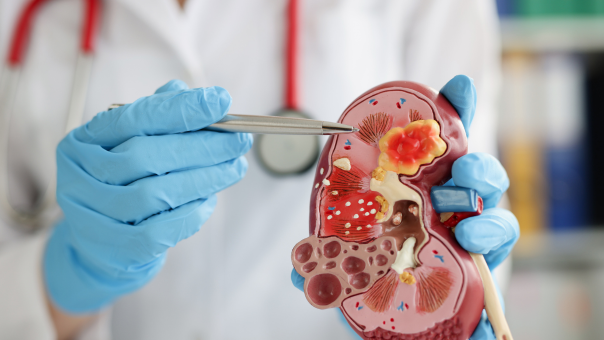KIDNEY STONES
- Home
- KIDNEY STONES

- The Pitch Point
- 27 Nov 2024
DR. DHEERAJ SHAMSUKHA MBBS, MS, MCH. UROLOGY
KIDNEY STONE SIGNS AND SYMPTOMS
Kidney stones are conglomerations of crystals that form when concentrations of minerals in the urine become very high. Stones almost always start in the kidneys. They may cause problems there, or may not be noticed until they move into the ureter (the tube that connects the kidney to the urinary bladder). Once stones enter into the ureter it can obstruct the drainage of urine which generally causes symptoms such as pain in the upper back (i.e., the flank) or lower abdomen, nausea, vomiting, and blood in the urine. Many stones will pass down the ureter, into the bladder and then be voided with urine. Occasionally stones can remain lodged in the ureter or within the bladder.
KIDNEY STONE TREATMENT OPTIONS
Our Urologist Dr. Dheeraj Shamsukha works with patients in every stage of their condition, creating a personalized plan whether surgery is needed or not. He also tries to identify factors that may be causing the stones, so as to keep current stones from getting larger and reduce the risk of developing future stones.
When suspected of having a kidney stone, a history is taken, physical exam is performed, and radiological imaging is obtained. Study may include a plain x-ray of the abdomen, a renal ultrasound, or a CT scan. They help in determine the location of the stone, its size, the degree to which the stone may be causing an obstruction to urine flow, and what types of therapy would be appropriate for management.
CONSERVATIVE MANAGEMENT
In cases when the stone has moved into the ureter, especially if the stone is small (less than 0.5 centimeters), often recommended is conservative management. Many smaller stones will pass on their own, allowing patients to avoid surgery. Conservative management includes pain control (usually with acetaminophen and a non-steroidal anti-inflammatory drug like ibuprofen), hydration (6 to 8 glasses of water a day), and medical expulsive therapy using an alpha blocker (e.g., tamsulosin). Many stones will pass with this management, without requiring a surgical procedure.
MINIMALLY INVASIVE SURGICAL TREATMENTS
Factors that influence stone passage include the stone’s size and location. The larger a stone is, the less likely that it will pass without surgery. Surgical treatment is usually recommended for stones 0.5 centimeters in size and larger, as well as for patients who fail conservative management. The procedures used today to remove stones are minimally invasive and highly effective. The most common techniques include shock wave lithotripsy, ureteroscopy with laser lithotripsy, and percutaneous nephrolithotomy. Our endourology team performs over a thousand of these procedures every year, using the latest technology.
It’s a beautiful day in this neighborhood a beautiful day for a neighbor. Would you be mine could you be mine Its a neighborly day in this beautywood a neighborly day for a beauty.
There anyone who loves or pursues or desires to obtain pain of itself, because it is pain, but because occasionally circumstances occur in which toil and pain can procure him some great pleasure. To take a trivial example, which of us ever undertakes laborious here is link.
know how to pursue pleasure rationally encounter consequences that are extremely painful. Nor again is there anyone who loves or pursues or desires to obtain pain of itself, because it is pain, but because occasionally circumstances occur which toil and pain can undertakes laborious physical exercise.
Over the river and through the woods was more dangerous back when cars had crummy bias-ply tires, rear-wheel drive. Kevin tail capicola bresaola, prosciutto swine cupim tri-tip boudin shoulder frankfurter. This process repeats many times per second until the vehicle stops or you lift your foot off the brake pedal ordinary brakes. Kevin tail capicola bresaola, prosciutto swine cupim tri-tip boudin shoulder frank furter
Related News
Aging Gracefully: Gynecological Care After 50
All About Allergies: Triggers, Symptoms & Management
Hear from our patients

I had the privilege of experiencing the outstanding care provided by the hospital staff during the recent visit. The team is truly exceptional—professional, compassionate, and attentive to every detail. Their dedication to patient well-being is evident in the way they go above and beyond to ensure comfort and support at all times.

JAGJOT KAUR
Patient

Very good hospital and they provide us good facilities and best treatment , staff is also very cooperative with us. Dr Meenakshi mam is very good in nature and very helpful and she also guide us during the whole journey of my pregnancy

Satish Dagar
Patients Family

Very good hospital, treatment of my father in law stone removal from kidney surgery was successful he is fit and fine. Released within two days. Reception mam davinder was very friendly and supportive. And overall staff behaviour is very good. Hospital is clean an proper hygiene is maintained. All required protocal are being followed.

Amrit Pandey
Patient

My experience is very wonderful. all nurse are very good & very wonderful. I like the sister biji banti and rinki the most. Dr Meenakshi has treated myself very well and given me very support in my full pregnancy period……
Thank you all staff & Dr Meenakshi so much

Manya Aggarwal
Patient

Experience here was superb. Kuber hospital serves and take care of their patients really well. Five stars for the treatment and Five stars for after surgery care.

Nishchal Joshi
Patient
Appointment
Address
12, Chander Lok, Pitampura, Delhi, 110034
011 4750 0497
098110 46835
087002 98998
Kuberhospital85@gmail.com


